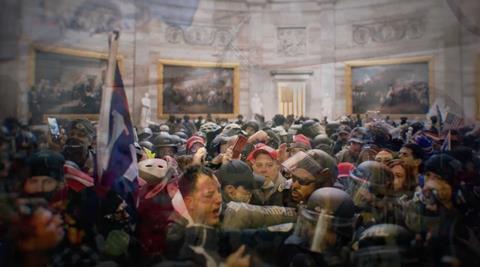Evangelical Christians in America have twisted the Christian story to align with partisan causes, says Jared Stacey. While a documentary can shine a spotlight on this, the only real antidote is a fresh encounter with God

Bad Faith is a new documentary that examines the role of American evangelical Christians leading up to the Capitol Insurrection on January 6 2021. This film is one of many recent attempts to understand the phenomena of Christian nationalism — from documentaries and podcasts to books, articles and conferences.
Before diving into the film (and why I think Christians in the UK should watch it) we should note the intense criticism surrounding the term ‘Christian nationalism’.
At best, Christian nationalism refers to a corrupt, ideological blend of Christian and American identities. At worst, it is a slogan that perpetuates the idea that religion and politics shouldn’t mix. But when ‘Christian nationalism’ becomes a slogan, it’s easy for Christians in America to miss the responsibility we are called to. The people and communities who need to see Bad Faith are, unfortunately, the ones least likely to watch it.
The Church must always be willing to address the roots of our own corruption. Today in the US, we’re confronted with moral hypocrisy and political idolatry within the evangelical faith. Some continue refer to this state of affairs as ‘Christian nationalism’.
When I was a church pastor a decade ago, what some call ‘Christian nationalism’, I might just have called ‘Christianity’. Because, at the time, there was little contradiction between the American story and the Christian story in my mind. To be a good Christian was entirely compatible with being a good American. This is the soil of what gets called Christian nationalism - and the fruit is poisonous.
Hope and optimism
Christians in the UK should watch Bad Faith to learn how they might pray for the Church in America. The film doesn’t give all the answers, but it can give a different perspective.
The term ‘Christian nationalism’ is overused, confused and contested - not unlike ‘evangelical’
One quote by Rev William Barber II, who leads the Poor People’s Campaign, resonated with me: “When it comes to America, I am not an optimist. I am full of Christian hope.” Bad Faith shows significant Christian resistance to so-called Christian nationalism, rooted in hope in the resurrection of Jesus Christ.
Can documentaries like Bad Faith help save democracy? Maybe. Maybe not. The challenge is that the crisis it analyses and the corruption it alleges must be addressed within and by the Church’s own language and practice.
Bad Faith tells a story from sociology, material network analysis and history. It highlights how evangelical Christians in America have twisted the Christian story to align with partisan causes. The antidote to this is a fresh encounter with God. No documentary can provide this, but it can provoke us to pray for it.
A deep crisis
The film successfully communicates that representative democracy in America is strained and fragile, and the political machine of evangelicalism is quick to justify acting outside of democratic processes by invoking evangelical faith. As the film argues, it is a crisis with deep historical roots in American racism and white supremacy - not just the last 50 years of American politics.
At times, the film’s analysis is sensational and conspiratorial, but it does provide a glimpse of how the evangelical faith justifies the corrupting pursuit of political power. This calls for a deeper moral and theological work that the Church must undertake. The power of the crucified Christ far surpasses the power of political privilege.
But what happens when we equate political privilege with divine blessing? Bad Faith doesn’t answer this question, and most evangelicals aren’t ready to either. I know I wasn’t.
A decade ago, my ideological reception of American history—including how it began and, more importantly, who it supposedly belonged to—was an integral part of my Christian identity. In my early 20’s I’d easily have dismissed Bad Faith. I wasn’t yet willing or able to interrogate some of the questions the film provokes.
Bad Faith tries to make a start in this direction, but there will always be deeper work in which prayer is so essential. Only by the in-breaking of God are we converted and awakened; only in an encounter with God do we have our minds renewed and changed.
A unique call
It’s true that the term ‘Christian nationalism’ is overused, confused and contested - not unlike ‘evangelical’. I’m all for better language, for telling the truth and honest speech. Which is why I believe churches have a unique vocation as witnesses to Jesus— the way, the truth, and the life.
The evangelical faith justifies the corrupting pursuit of political powe
Bad Faith is released as Donald Trump is facing charges that could send him to prison in the middle of his bid for a second term in the White House. These seem like uncharted waters, but so did the years before the Civil War or just after.
In it all, Christians have a vested interest in creating a healthy, representative democracy, but this is only part of our responsibility to live and speak as agents of reconciliation. Tragically, we are refusing our call to reconciliation and aligning with a cause of retribution.
This crisis signals the theological loss which marks our time. We love having enemies in America more than we imagine ways to love our enemies. Bad Faith, though it may have other aims, makes this plain.
Watch it and see what we have chosen for ourselves. And pray that God would open our eyes, again, to the Word that empties rogue creeds like “Make America Great Again” of their power.





































1 Reader's comment